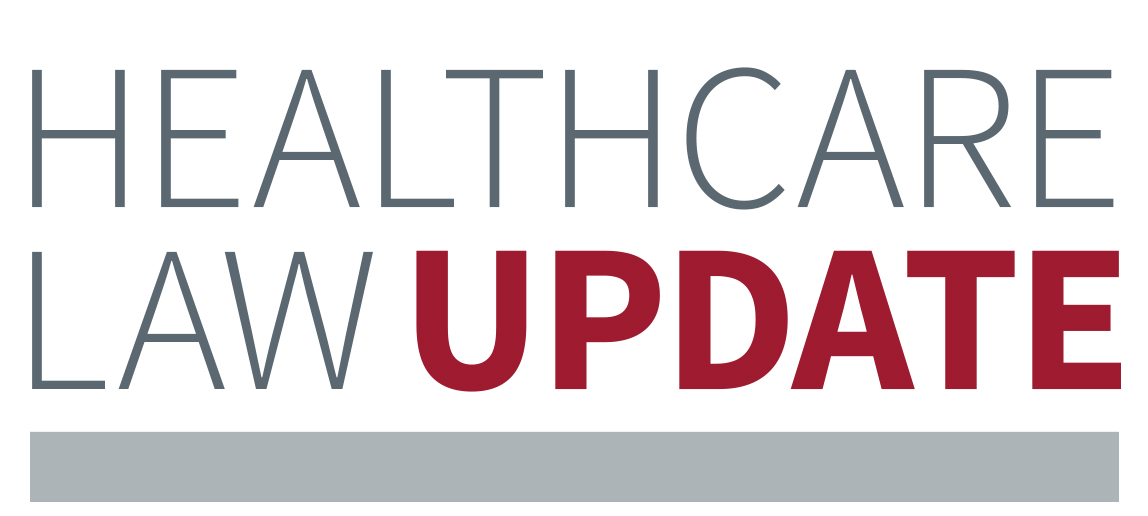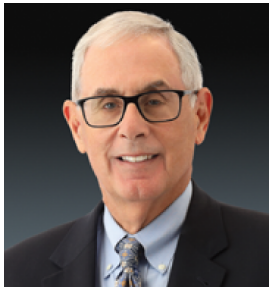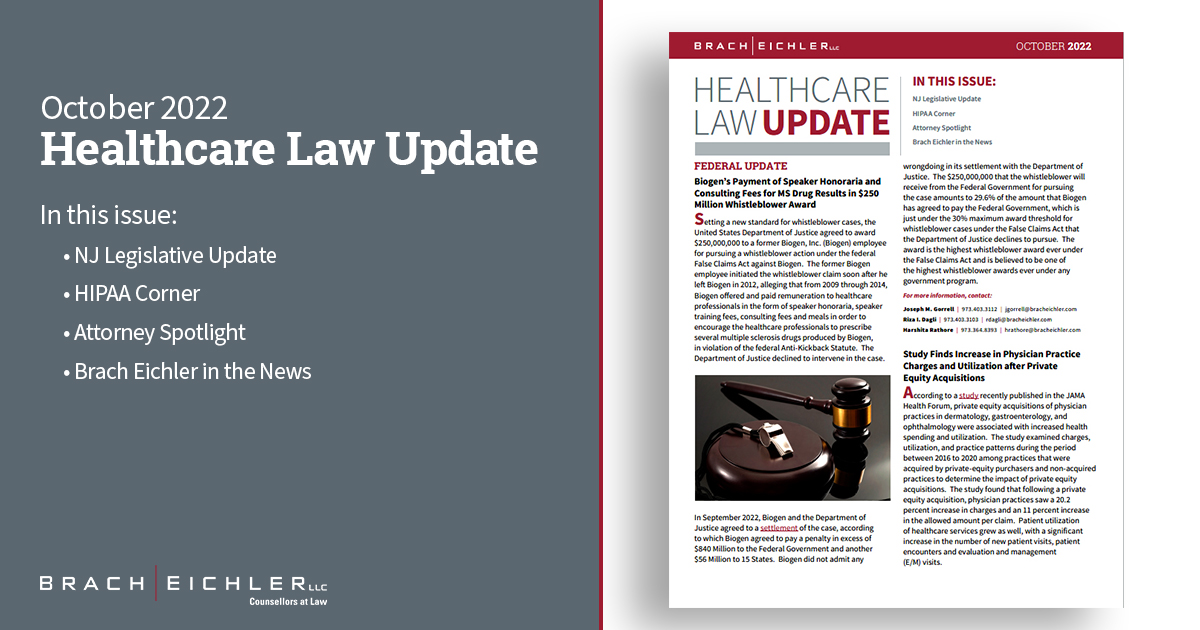

Setting a new standard for whistleblower cases, the United States Department of Justice agreed to award $250,000,000 to a former Biogen, Inc. (Biogen) employee for pursuing a whistleblower action under the federal False Claims Act against Biogen. The former Biogen employee initiated the whistleblower claim soon after he left Biogen in 2012, alleging that from 2009 through 2014, Biogen offered and paid remuneration to healthcare professionals in the form of speaker honoraria, speaker training fees, consulting fees and meals in order to encourage the healthcare professionals to prescribe several multiple sclerosis drugs produced by Biogen, in violation of the federal Anti-Kickback Statute. The Department of Justice declined to intervene in the case.

In September 2022, Biogen and the Department of Justice agreed to a settlement of the case, according to which Biogen agreed to pay a penalty in excess of $840 Million to the Federal Government and another $56 Million to 15 States. Biogen did not admit any
wrongdoing in its settlement with the Department of Justice. The $250,000,000 that the whistleblower will receive from the Federal Government for pursuing the case amounts to 29.6% of the amount that Biogen has agreed to pay the Federal Government, which is just under the 30% maximum award threshold for whistleblower cases under the False Claims Act that the Department of Justice declines to pursue. The award is the highest whistleblower award ever under the False Claims Act and is believed to be one of the highest whistleblower awards ever under any government program.
For more information, contact:
Joseph M. Gorrell | 973.403.3112 | jgorrell@bracheichler.com
Riza I. Dagli | 973.403.3103 | rdagli@bracheichler.com
Harshita Rathore | 973.364.8393 | hrathore@bracheichler.com
According to a study recently published in the JAMA Health Forum, private equity acquisitions of physician practices in dermatology, gastroenterology, and ophthalmology were associated with increased health spending and utilization. The study examined charges, utilization, and practice patterns during the period between 2016 to 2020 among practices that were acquired by private-equity purchasers and non-acquired practices to determine the impact of private equity acquisitions. The study found that following a private equity acquisition, physician practices saw a 20.2 percent increase in charges and an 11 percent increase in the allowed amount per claim. Patient utilization of healthcare services grew as well, with a significant increase in the number of new patient visits, patient encounters and evaluation and management (E/M) visits.
The variations were not consistent among each specialty. For example, E/M visits rose significantly for dermatology and ophthalmology but not gastroenterology, while allowed amounts per claim increased for dermatology and gastroenterology but not ophthalmology. The JAMA Health Forum study contrasts sharply with the findings of a recent study of private-equity acquired ambulatory surgery centers (ASCs) conducted by Health Affairs, which found only slight increases in charges and utilization by ASCs between pre-acquisition and post acquisition periods, and showed only a slight increase in clinical outcomes and quality of care during the post acquisition period.
For more information, contact:
John D. Fanburg, Chair | 973.403.3107 | jfanburg@bracheichler.com
Jonathan J. Walzman | 973.403.3120 | jwalzman@bracheichler.com
Sally Olson | 973.403.3102 | solson@bracheichler.com
Almost seven months after the Department of Justice (DOJ) filed its initial complaint to halt the merger between United Healthcare Group (United Healthcare) and Change Healthcare due to anti-trust concerns, the parties completed their $7.8 billion merger on October 3, 2022. In its initial complaint, the DOJ alleged that a merger between United Healthcare, one of the largest health insurers, and Change Healthcare, a leader in healthcare technology that supported some of United Healthcare’s key competitors, would lead to unfair competition. The DOJ further alleged that the merger would allow United Healthcare to unfairly use Change Healthcare’s data to bolster its subsidiaries. On September 19, 2022, the Court ruled in favor of the merger and rejected the alleged antitrust issues raised by the DOJ.
In addition to permitting the merger to move forward, the Court ordered Change Healthcare to divest the claim editing business ClaimsXten to the private equity firm TPG Capital for $2.2 billion. ClaimsXten offers claims editing technology and was the main point of direct competitive overlap between United Healthcare and Change Healthcare.
For more information, contact:
Isabelle Bibet-Kalinyak | 973.403.3131 | ibibetkalinyak@bracheichler.com
Caroline J. Patterson | 973.403.3141 | cpatterson@bracheichler.com
Erika R. Marshall | 973.364.5236 | emarshall@bracheichler.com
On September 2, 2022, the Department of Justice (DOJ) announced that Bayer Corporation, a manufacturer of pharmaceutical products, agreed to pay $40 million to resolve alleged violations of the federal False Claims Act and applicable state laws in connection with the drugs Trasylol, Avelox, and Baycol. The settlement stemmed from two whistleblower lawsuits filed in 2005 and 2006 by a former Bayer employee.

According to the DOJ, Bayer paid kickbacks to hospitals and physicians to induce them to use the drugs Avelox, which treats bacterial infections, and Trasylol, which controls bleeding in heart surgeries, and also marketed these drugs for off-label uses that were not reasonable and necessary. The whistleblower further alleged that Bayer downplayed the safety risks of Trasylol. The whistleblower filed a second lawsuit relating to the drug Baycol, a statin that lowers cholesterol and prevents cardiovascular disease. That lawsuit alleged that Bayer downplayed Baycol’s risks of causing rhabdomyolysis and misrepresented the efficacy of Baycol as compared to other statins. Trasylol and Baycol were withdrawn from the market for safety reasons.
Under the settlement, Bayer will pay $38.9 million to the United States and $1.14 million to 20 states and the District of Columbia. Bayer did not admit any wrongdoing.
For more information, contact:
Keith J. Roberts | 973.364.5201 | kroberts@bracheichler.com
Joseph M. Gorrell | 973.403.3112 | jgorrell@bracheichler.com
James Ko | 973.403.3147 | jko@bracheichler.com

On June 29, 2022, the Department of Health and Human Services, Office of Inspector General (OIG) issued Advisory Opinion 22-14 regarding four proposed arrangements whereby an ophthalmology practice would provide free or subsidized continuing education (CE) programs to local optometrists, including optometrists who are in a position to refer patients to the practice.
Under Arrangement A, the ophthalmology practice would charge attendees a fair market value (FMV) registration fee to attend the CE programs. Under Arrangement B, the ophthalmology practice would not charge attendees to attend the CE programs and, instead, cover the entire cost of the CE programs. Under Arrangement C, the ophthalmology practice would not charge attendees to attend CE programs but would instead solicit funding from industry sponsors such as medical device or pharmaceutical companies. Lastly, under Arrangement D, the ophthalmology practice would charge attendees a registration fee to attend the CE programs but subsidize a portion of the programs using funding from industry sponsors.
The OIG determined that Arrangement A presented low risk under the federal Anti-Kickback Statute (AKS) because attendees would be paying a registration fee consistent with FMV and sponsors would not be providing any funding for the CE programs. The OIG determined that Arrangements B and C presented a high risk under the AKS because the attendees would be able to attend the CE programs for free, and because providing free goods or services to referral sources is problematic under the AKS. Moreover, Arrangement C posed a heightened risk under the AKS because the sponsors’ subsidies could induce optometrist attendees to order the sponsors’ products. Similarly, the OIG determined that Arrangement D presented a high risk under the AKS because the sponsors’ subsidies could induce the ophthalmology practice to order the sponsors’ products.
For more information, contact:
Carol Grelecki | 973.403.3140 | cgrelecki@bracheichler.com
Edward J. Yun | 973.364.5229 | eyun@bracheichler.com
Sally Olson | 973.403.3102 | solson@bracheichler.com
On August 31, 2022, the Department of Health and Human Services, Office of Inspector General (OIG) issued Advisory Opinion No. 22-17 regarding the proposed restructuring of a financial relationship between a not-for-profit healthcare system and a clinic designated as a Federally Qualified Health Center (FQHC) Look-Alike.
The healthcare system and clinic furnish services to patients in medically underserved areas where there is a shortage of health professionals. Previously, the healthcare system collaborated with the clinic to expand access for low-income residents, reduce barriers to accessing quality healthcare services, and improve the overall health of its patients. In doing so, the healthcare system provided financial support to the clinic that the clinic has been unable to repay.
Under the proposed arrangement, the healthcare system would restructure its prior agreements and ultimately forgive the debt owed by the clinic through a donation to the clinic. The proposed arrangement would implicate the federal Anti-Kickback Statute (AKS) because it would involve remuneration from the healthcare system to the clinic that could induce the clinic to refer patients to the healthcare system. However, the OIG concluded that the proposed arrangement poses a low risk of fraud and abuse under the AKS for certain reasons, including:
• The proposed arrangement would be implemented in a manner that aligns with all requirements of the FQHC Safe Harbor (even though the clinic is an FQHC Look-Alike);
• Neither the healthcare system nor the clinic is under any obligation to make referrals to one another; and
• The remuneration provided under the proposed arrangement is a continuation of the healthcare system’s longstanding support of the clinic to expand access to healthcare for low-income residents.
For more information, contact:
Isabelle Bibet-Kalinyak | 973.403.3131 | ibibetkalinyak@bracheichler.com
Edward J. Yun | 973.364.5229 | eyun@bracheichler.com
Cynthia J. Liba | 973.403.3106 | cliba@bracheichler.com
A federal court in New Jersey recently dismissed a motion filed by a clinical laboratory that is suing Horizon Blue Cross Blue Shield of New Jersey (Horizon) to dismiss Horizon’s insurance fraud claim against the clinical laboratory. The clinical laboratory, Open MRI and Imaging of RP Vestibular Diagnostics, filed suit against Horizon in May of 2021 claiming Horizon failed to pay insurance claims filed by the clinical laboratory for COVID-19 rapid testing. Horizon filed a counterclaim against the clinical laboratory and its owners, alleging that the owners of the laboratory engaged in a scheme set up to defraud Horizon.
In its counterclaim, Horizon asserted that the lab and its owners were not authorized to administer COVID-19 rapid tests, billed for services that were not rendered, created a new entity to submit backdated claims, and have an unlawful corporate structure because a non-physician was an owner of the lab. The Court denied the clinical laboratory’s motion to dismiss, finding that Horizon adequately pleaded the details supporting its allegations of the fraudulent scheme related to the
COVID-19 testing.
For more information, contact:
Keith J. Roberts | 973.364.5201 | kroberts@bracheichler.com
Shannon Carroll | 973.403.3126 | scarroll@bracheichler.com
Paul DeMartino, Jr. | 973.364.5228 | pdemartino@bracheichler.com
Assembly Bill 4544, introduced in the New Jersey General Assembly and referred to the Health Committee on September 22, 2022, would require hospital employees to determine whether a patient has health insurance before discharge. If the hospital employees determine that the patient does not have health insurance coverage, a hospital employee would be required to assist the uninsured patient with creating an account to apply for insurance coverage through the Federally-Facilitated Marketplace.
Assembly Bill 4536, introduced in the New Jersey General Assembly and referred to the Health Committee on September 22, 2022, would require minimum registered professional nurse staffing standards for hospitals, ambulatory surgical facilities, state developmental centers, and psychiatric hospitals. The bill is in response to the current nursing shortage, which is linked to higher levels of job dissatisfaction, burnout, and turnover caused by understaffing. In addition, these facilities would be required to use an acuity and staffing system, approved by the Commissioner of Health, to increase direct care registered professional nurse staffing levels above the minimum levels to be established or provided by law or regulation.
Assembly Bill 4608, introduced in the New Jersey General Assembly and referred to the Health Committee on September 22, 2022, would allow hospital patients with developmental disabilities to designate a family member, guardian, direct support professional, or another caregiver to accompany the patient throughout the hospital stay except when patient is undergoing a surgical procedure and would be endangered by the presence of the designated person. The patient or the patient’s parent or guardian may elect, at any time, to change the designation.
On September 2, 2022, the Commissioner of the New Jersey Department of Health revised Executive Directive 21-011, setting forth protocols for COVID-19 testing and vaccination reporting for healthcare and high-risk congregate settings. The revised Executive Directive omits school settings, childcare centers, and other childcare facilities from the list of covered settings. The revised Executive Directive provides that healthcare and high-risk congregate settings should monitor the CDC Community Transmission Levels to determine the appropriate testing frequency for exempted workers.
On September 6, 2022, the New Jersey Division of Consumer Affairs published updated dollar limits for “modest meals” accepted by prescribers from pharmaceutical manufacturers. Prescribers, who are not speaking or providing services at promotional activities are allowed to accept a breakfast or lunch up to $17 and dinner up to $35. The limits are in place to ensure that relationships with pharmaceutical manufacturers do not interfere with the prescriber’s independent professional judgment.
On September 29, 2022, the Senate Labor Committee met to consider moving forward with Senate Bill 1410, which was introduced in the New Jersey State Senate on February 10, 2022, and proposes certain limitations on restrictive covenants between employers and employees. Specifically, the bill stipulates that a restrictive covenant is enforceable only if it is disclosed to employees 30 days before employment, limits restrictions on protecting the employer’s business interests, and gives notice to employees that they have a right to consult counsel before signing the agreement. The bill also requires employers to notify employees of their intent to enforce the agreement within 10 days after termination and allows employees to recover the pay they would have earned if they were not subjected to the terms of a prohibited restrictive covenant.
For more information, contact:
John D. Fanburg, Chair | 973.403.3107 | jfanburg@bracheichler.com
Edward Hilzenrath | 973.403.3114 | ehilzenrath@bracheichler.com
Vanessa Coleman | 973.364.5208 | vcoleman@bracheichler.com
Dental practices take notice: the HIPAA enforcers are serious about HIPAA compliance, including adhering to HIPAA’s “right of access” requirement. Under HIPAA, individuals are entitled to “access” their health records maintained by a provider in a “designated record set.” The designated record set is essentially the patient’s health records and billing records maintained by a health care provider that is subject to HIPAA. The right of access includes the right to receive copies of health and billing records and the right to view such records maintained by the provider, upon request. Providers who withhold
such records when requested by the patient or do not provide timely access to such records within the timeframes required under HIPAA may be subject to hefty sanctions.
On September 20, 2022, the Department of Health & Human Services, Office for Civil Rights (OCR), the HIPAA enforcement agency, announced the settlement of three cases against dental practices for alleged violations of the right of access rule. The first settlement involved allegations that, although the dental practice provided portions of the patient’s record when the patient requested her entire record, the practice did not provide a complete copy of the patient’s record until more than five months after the request was made. Under this settlement, the dental practice agreed to pay a fine of $30,000 and implement a corrective action plan. The second settlement involved allegations that the dental practice did not provide the patient with a copy of her record for more than a year after the request was made, and that the practice withheld the record because the patient would not pay a $170 copying fee. The dental practice agreed to pay a fine of $80,000 and implement a corrective action plan. The third settlement involved allegations that the dental practice withheld a minor patient’s record for more than eight months after the patient’s mother requested the record. Under the settlement with the OCR, the practice agreed to pay a fine of $25,000 and implement a corrective action plan.
The OCR has now announced 23 settlements of investigations involving alleged violations of HIPAA’s right of access rule since the OCR began its “right of access initiative” in 2019. The HIPAA enforcers have made clear that patients have the right to receive timely access to their records at a reasonable cost in compliance with HIPAA.
If you need assistance with your HIPAA compliance program, an OCR investigation, or a data breach incident, please contact:
Lani M. Dornfeld, CHPC | 973.403.3136 | ldornfeld@bracheichler.com
Get to know the faces and stories of the people behind the articles in each issue. This month, we invite you to meet
Member Joseph Gorrell and and Associate Harshita Rathore.

Briefly describe a recent significant transaction, win or client victory.
I recently presided as a hearing officer in a hearing before a committee of a medical staff at a hospital in the Midwest. The hearing before a committee of five physicians, which consumed numerous hours, concerned an appeal from the suspension of the privileges of a member of the medical staff because the member refused to abide by policies adopted by the hospital during the Covid-19 epidemic. After presiding over the hearing and consulting with the committee, I prepared a hearing report and recommendation for the committee, which was provided to the hospital.
Why did you choose to focus your legal practice on healthcare law and the healthcare industry?
In 1981, while serving as a Deputy Attorney General, I was asked to represent the New Jersey State Board of Medical Examiners, and was subsequently asked to provide legal counsel to the University of Medicine and Dentistry of New Jersey. I found the intersection of law, medicine and the healthcare industry to be fascinating, and decided to devote my legal career to healthcare law, which I have practiced ever since. Hardly a day goes by when a new and interesting legal problem does not arise, making the practice fresh and engaging to this day.

Briefly describe a recent significant transaction, win or client victory.
We recently represented an ophthalmology practice in the sale of its assets to a private equity firm and merger into a New Jersey medical practice. We successfully completed the transaction, meeting the client goals, complying with applicable regulations, and fulfilling the business and legal aspects of the sale.
Why did you choose to focus your legal practice on healthcare law and the healthcare industry?
Having witnessed the healthcare structures in India and the United Kingdom, I was intrigued by the everchanging nature of the healthcare industry. When I got an opportunity to learn and practice healthcare law as part of Brach Eichler, it provided me with the perfect platform to explore the challenges and intricacies of the health care industry. I believe that helping health care providers to interpret these changes and challenges enables them to focus on providing better care services to the community.

On September 19, Healthcare Member Isabelle Bibet-Kalinyak opined in HealthTech magazine about “How an Early IT Integration Vision Leads to M&A Success in Healthcare.”
On September 30, Brach Eichler was recognized by NJBIZ as a 2022 Best Places to Work.
On October 14, Brach Eichler was honored to receive the “Outstanding Service Award” at The Center for Great Expectations – Hope Lives Here 2022 Annual Gala.
Brach Eichler Healthcare Law Chair John D. Fanburg and Members Isabelle Bibet-Kalinyak and Carol Grelecki will present a Legal & Regulatory Update:
• On October 14, at The New Jersey Academy of Ophthalmology’s (NJAO) 2022 Annual Meeting
• On November 4, at The New Jersey Obstetrical and Gynecological Society’s Semi-Annual Meeting
• On November 5, at The Radiology Society of New Jersey’s CT Body Imaging Symposium

Attorney Advertising: This publication is designed to provide Brach Eichler LLC clients and
contacts with information they can use to more effectively manage their businesses. The contents
of this publication are for informational purposes only. Neither this publication nor the lawyers who
authored it are rendering legal or other professional advice or opinions on specific facts or matters.
Brach Eichler LLC assumes no liability in connection with the use of this publication.

Riza I. Dagli | 973.403.3103 | rdagli@bracheichler.com
Lani M. Dornfeld | 973.403.3136 | ldornfeld@bracheichler.com
John D. Fanburg, Chair | 973.403.3107 | jfanburg@bracheichler.com
Joseph M. Gorrell | 973.403.3112 | jgorrell@bracheichler.com
Edward Hilzenrath, HLU Editor | 973.403.3114 | ehilzenrath@bracheichler.com
Keith J. Roberts | 973.364.5201 | kroberts@bracheichler.com
Jonathan J. Walzman | 973.403.3120 | jwalzman@bracheichler.com
Edward J. Yun | 973.364.5229 | eyun@bracheichler.com
Shannon Carroll | 973.403.3126 | scarroll@bracheichler.com
Caroline J. Patterson | 973.403.3141 | cpatterson@bracheichler.com
Paul J. DeMartino, Jr. | 973.364.5228 | pdemartino@bracheichler.com
Emily J. Harris | 973.364.5205 | eharris@bracheichler.com
James J. Ko | 973.403.3147 | jko@bracheichler.com
Erika R. Marshall | 973.364.5236 | emarshall@bracheichler.com
Sally Olson | 973.403.3102 | solson@bracheichler.com
Harshita Rathore | 973.364.8393 | hrathore@bracheichler.com
Roseland, NJ | New York, NY | West Palm Beach, FL | www.bracheichler.com | 973.228.5700




